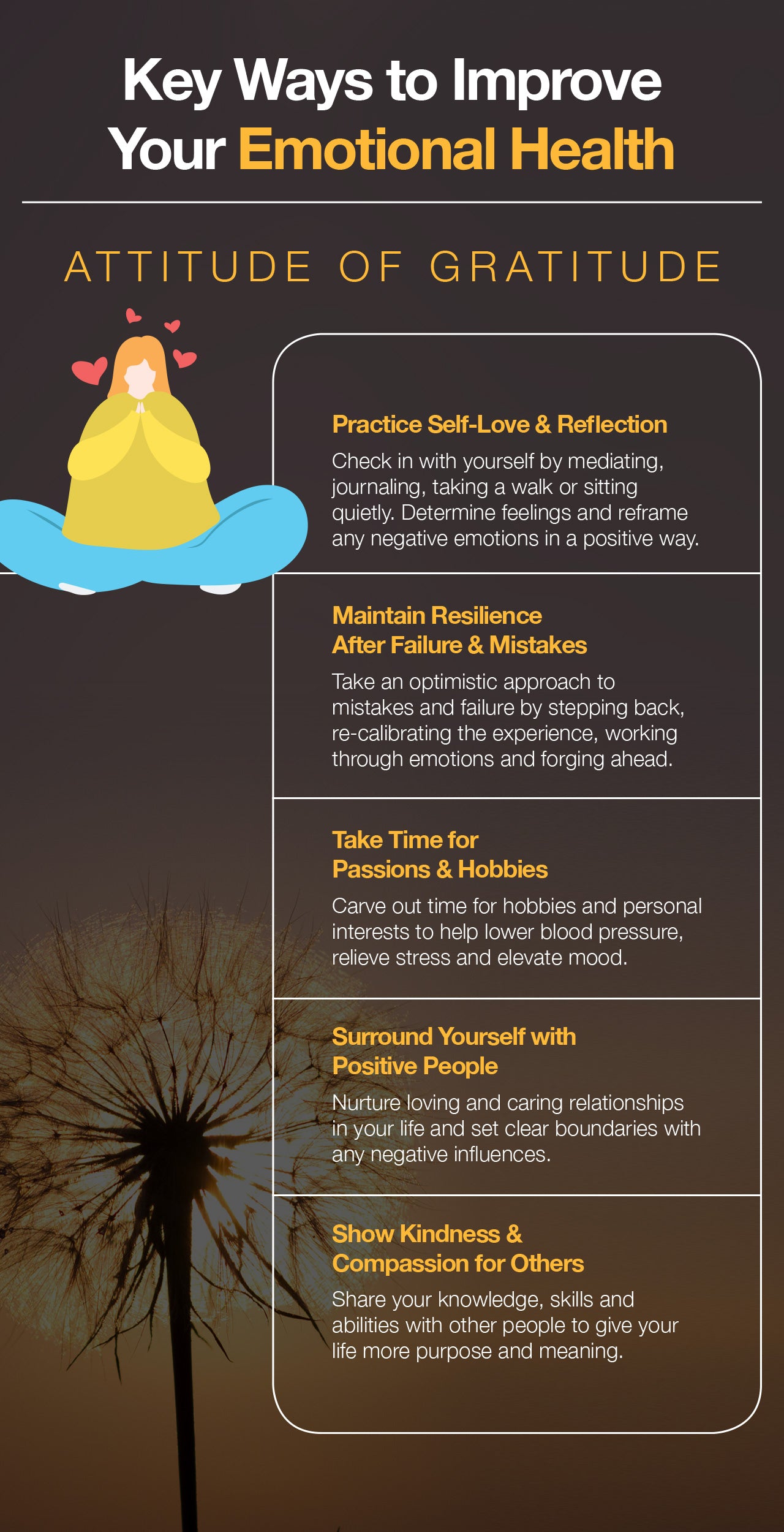5 Habits of Emotionally Healthy People
 By: by Amino Science
By: by Amino Science

Your emotional health is the epicenter of your overall well-being and outlook on life. It is intricately tied to your physical health, your relationships, and how you navigate through life’s ups and downs. You likely have met someone who seems genuinely happy most days, is able to cope with changes gracefully, and is a positive force to be around. What's their secret? Can anyone find balance and be an emotionally healthy person?
The great news is many of these healthy habits are choices, and you truly can choose to be happy simply by making small shifts in your way of thinking and how you approach both challenges and opportunities. The goal is not to achieve emotional perfection, but rather emotional intelligence—to be able to manage your feelings effectively and keep a positive outlook as you move through life. Here are five habits of emotionally healthy people that can help inspire and motivate you on your search for emotional health and balance.
1. Practice Self-Love and Reflection
It all begins with you. Emotional well-being truly comes from within, and emotionally healthy people practice self-love and self-care every day.
Being kind to ourselves is often difficult, and it’s easy to get caught in a cycle of negative self-talk and criticism. It’s essential to strengthen your self-awareness muscle and identify when this impolite voice starts to chatter away, and quickly reverse it. Offer yourself the support and encouragement you would a friend; doing so will positively affect your emotions and overall state of mind.
Learn to identify what triggers your negative emotions and implement healthy ways to respond when these feelings pop up. It’s unrealistic to avoid feeling angry, sad, or upset. Instead it’s important to face these sensations, let them flow through you, and then let go of what no longer serves you.
Loving yourself improves your self-worth and sets expectations for how you should be treated. When you are compassionate toward yourself, you automatically send that outwards, improving your relationships with other people.
It may take a little practice, but try to find moments that allow reflection, either through meditation, journaling, a walk, or sitting quietly. Having a peaceful space to check in with yourself allows you to get in touch with anything that may need your attention. Determine how you’re feeling or what may be worrying you and reframe any negative emotions in a resourceful way. For instance, if the thought, “I’m so lazy, why can’t I get to the gym every day like I should?” is plaguing your mind, take a moment to review it and amend it. Try a simple change to “I would love to get to the gym every day, but my schedule just doesn’t allow it right now. I will get there as often as I can, and when I can’t, I will try to take a quick walk or play in the yard with the kids.”
The more you become in tune with your reactions and the reasons for your certain emotions, you’ll have better luck at remaining flexible and optimistic when faced with challenging people or situations.
2. Maintain Resilience After Failures and Mistakes
No one likes the dreaded F word—failure. It sure can sting and knock you off balance, but failure is an important step to mastering your emotions. It helps you evolve and strengthens your resiliency.
When life throws a curveball, emotionally healthy people are able to maintain flexibility, not take it personally, and choose effective action in the face of emotional discomfort. It’s important to learn how to control your thoughts, feelings, and behaviors, especially when facing life’s difficulties. Resilient people understand setbacks are disappointing but temporary, and refuse to let failure define them or their qualities.
Healthy emotional habits include taking an optimistic approach by stepping back, recalibrating the experience, working through the emotions, and then forging ahead. For example, you were really set on a big promotion at work. You’ve been working extra hours, speaking up in meetings, and taking on hard challenges and projects. Then when the big day comes, you find out you’ve been passed up and the promotion went to someone else. While it can be heartbreaking, it’s proactive to avoid passing blame, getting overcome by frustration, and allowing anger to take over. Instead, after allowing yourself to feel disappointed, run through what you think you could have done differently, applaud yourself for the things you did accomplish, and focus on the positives like the sharpening of certain skills or increasing visibility within your team. Then, while keeping your head high, revise your plan and continue moving toward your goal.
When it comes to making mistakes, the same train of thought applies. Even though mistakes are often embarrassing and unpleasant, they are lessons in disguise and present an opportunity for reflection to help you avoid making the same error in the future. Emotionally resilient people accept responsibility for their mistakes and determine what could have been done differently to have produced a better result. A good reminder is just because you made a mistake, that doesn’t make you a failure.
3. Take Time for Passions and Hobbies
Break out your beloved stamp collection! Whatever it is that brings you joy, embrace it and take time to fit it into your life. If you don’t currently have a favorite activity, invest time into finding one by asking friends, browsing the library, or looking for inspiration from your past.
The happiest, most emotionally stable people have something they do just for the sheer enjoyment of it. A hobby is yours and yours alone and brings a feeling of accomplishment, excitement, and creative freedom to your day-to-day. Plus, it provides a sense of purpose and often gives a unique perspective to other areas of your life. Whether it’s woodworking, painting, or bird watching, personal pursuits provide physical health benefits, such as helping to lower blood pressure, relieve stress, and elevate mood. Carving out time to enjoy your interests is one of the best things you can do for your emotional and physical health.

4. Surround Yourself with Positive People
Life’s too short to spend it with miserable people, so choose your company wisely and find your tribe. Just like germs, emotions are contagious and when you surround yourself with happy people, you can’t help but be happy too. Having loving and caring relationships in your life helps you feel connected and accepted, and promotes a positive mood and outlook on life.
Emotionally healthy people have a well-established support system that provides guidance and a needed boost when going through difficult times. When you know you have people to fall back on, it makes the trials of life a little less intimidating.
It’s extremely important to set boundaries with difficult relationships and get rid of negative influences that do not provide a good element to your life. As the adage goes, misery loves company and toxic people often sabotage your self-improvement journey and threaten your emotional health. Being involved in a toxic relationship usually takes a toll on your self-esteem since the other person picks on your weaknesses.
Becoming more in tune with yourself, appreciating both your strengths and flaws and not letting negative people affect you, can greatly protect you from being brought down. Your best bet is to stay in close contact with people who make you feel safe, cherished, and happy.
5. Show Kindness and Compassion for Others
Emotionally healthy people make a dedicated effort to positively impact the world around them and reach out to others. An important step in finding emotional balance is recognizing that life isn’t solely about you and that you have the power to influence the lives around you.
Sharing your knowledge, skills, and abilities with other people gives your life more purpose and a deeper meaning. Showing compassion towards others and doing selfless acts of kindness are linked to personal happiness and contentment. When you give to another, especially to someone in need, you promote empathy within yourself and in turn enhance your sense of interconnectedness with others.
You’ll often find that those who are eager to provide a helping hand are among the most emotionally upbeat because, simply put, doing good makes you feel good. Doing a good deed doesn’t require big bucks or even a lot of time. Small efforts can have a large impact. Try volunteering, mentoring, or random acts of kindness to positively influence others and improve your own sense of accomplishment and self-esteem.
Your emotional and mental health is just as important as your physical health. It makes us who we are and keeps us motivated to move forward in life with enthusiasm and energy. There are several secrets of emotionally healthy people; most importantly they manage their emotions, rather than letting their emotions manage them. You too can fine-tune your outlook and adopt habits that promote your emotional health. Choose a positive attitude, be grateful for what you have, and open your heart to others—it will be one of the greatest gifts you could ever receive.



 833-264-6620
833-264-6620


















